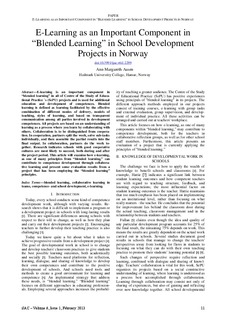| dc.contributor.author | Aasen, Ann Margareth | |
| dc.date.accessioned | 2013-07-10T11:05:31Z | |
| dc.date.available | 2013-07-10T11:05:31Z | |
| dc.date.issued | 2013 | |
| dc.identifier.issn | 1867-5565 | |
| dc.identifier.other | http://www.i-jac.org | |
| dc.identifier.uri | http://hdl.handle.net/11250/134586 | |
| dc.description | The original publication is available at: doi:10.3991/ijac.v6i1.2299 | no_NO |
| dc.description.abstract | E-learning is an important component in
“blended learning” in all of Centre of the Study of Educational
Practice `s (SePU) projects and is used for additional
education and development of competences. Blended
learning is defined as learning facilitated by the effective
combination of different modes of delivery, models of
teaching, styles of learning, and based on transparent
communication among all parties involved in development
competences. All projects are based on an understanding of
learning as a process where you learn by collaborating with
others. Collaboration is to be distinguished from cooperation.
In cooperation, partners split the work, solve sub-tasks
individually, and then assemble the partial results into the
final output. In collaboration, partners do the work together.
Research indicates schools with good cooperative
cultures are most likely to succeed, both during and after
the project period. This article will examine how e-learning,
as one of many principles from “blended learning,” can
contribute to competence development through collaborative
learning and present some evaluation results from a
project that has been employing the “blended learning”
principles. | no_NO |
| dc.language.iso | eng | no_NO |
| dc.relation.uri | http://online-journals.org/i-jac/article/view/2299 | |
| dc.subject | blended learning | no_NO |
| dc.subject | collaborative learning | no_NO |
| dc.subject | e-learning | no_NO |
| dc.subject | competence development | no_NO |
| dc.subject | school development | no_NO |
| dc.title | E-Learning as an Important Component in “Blended Learning” in School Development Projects in Norway | no_NO |
| dc.type | Journal article | no_NO |
| dc.type | Peer reviewed | no_NO |
| dc.subject.nsi | VDP::Social science: 200::Education: 280::Special education: 282 | no_NO |
| dc.source.pagenumber | 11-15 | no_NO |
| dc.source.volume | 6 | no_NO |
| dc.source.journal | International Journal of Advanced Corporate Learning (iJAC) | no_NO |
| dc.source.issue | 1 | no_NO |
| dc.identifier.doi | 10.3991/ijac.v6i1.2299 | |
